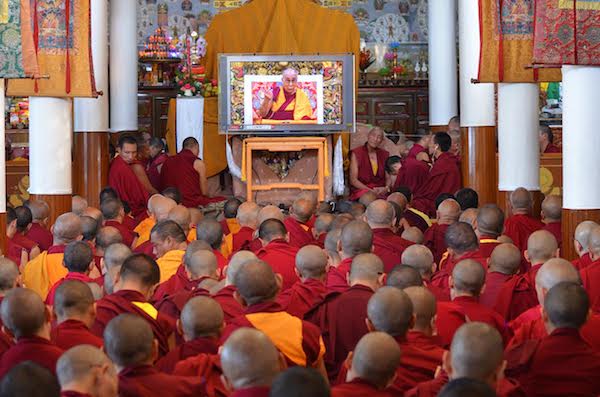 His Holiness the Dalai Lama gave a four day teaching from October 3 – 6, Aryadeva’s Four Hundred Stanzas on the Middle Way (umashigyapa) at Thekchen Chöling, the Main Tibetan Temple in Dharamshala. The teaching was held at the request of a group of 1,000 Taiwanese people. In addition to the Taiwanese disciples, around 1,650 people from 64 different countries flocked to hear the teaching along with Tibetan and Indians devotees. The Four Hundred Stanzas is one of the fundamental works of Mahayana Buddhist philosophy, and explains how the practices of the stages of yogic deeds enable Mahayana practitioners to realise Buddhahood.
His Holiness the Dalai Lama gave a four day teaching from October 3 – 6, Aryadeva’s Four Hundred Stanzas on the Middle Way (umashigyapa) at Thekchen Chöling, the Main Tibetan Temple in Dharamshala. The teaching was held at the request of a group of 1,000 Taiwanese people. In addition to the Taiwanese disciples, around 1,650 people from 64 different countries flocked to hear the teaching along with Tibetan and Indians devotees. The Four Hundred Stanzas is one of the fundamental works of Mahayana Buddhist philosophy, and explains how the practices of the stages of yogic deeds enable Mahayana practitioners to realise Buddhahood.
On the first day of the teaching, His Holiness expressed his joy in seeing many Indian devotees who taking an interest in Buddhism. “The studies of Buddhist philosophy, particularly the Nalanda tradition are an Indian ancestral tradition. Buddha himself was an Indian. The great Nalanda tradition was first spread in India. Therefore it is in the primary interest of Indians to preserve their heritage, religion and culture”, said His Holiness.
He further explained that Tibetan Buddhism which has such a huge influence on the various aspects of Tibetan culture and knowledge, originated in India. “Study of Buddhist philosophy through logic and reason was first brought to Tibet by the great Nalanda master Shantarakshita. It then spread widely in Tibet when the ancient texts and epistemology [a branch of philosophy that investigates the origin, nature, methods, and limits of human knowledge] were translated into Tibetan in the seventh century. As the epistemologies were being translated into Tibetan, so the Tibetan language and vocabulary was enhanced.”
Speaking to the Taiwanese devotees, His Holiness mentioned that Buddhism reached China way before being introduced to Tibet, hence Chinese Buddhists are the senior student compared to Tibetans and Mongolian Buddhists. “However, I think I can say that the junior student’s level of knowledge is not bad and we are all followers of the same Nalanda tradition.”
His Holiness also spoke on the importance of having a peaceful mind and of teaching universal values in schools as this enhances our health and general well being. “If the world situation continues to remain same it is going to be unfortunate. Around 200 million people have been killed in all kinds of war and many are starving right this moment. These disturbances are caused by men and therefore mankind should find a solution to these problems. Prayers are not the antidote to manmade problems.”




 Print
Print Email
Email